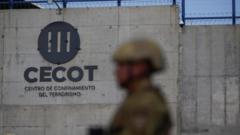The U.S. Supreme Court's recent decision allows President Trump to employ the Alien Enemies Act of 1798, enabling expedited deportation of alleged Venezuelan gang members to El Salvador. This ruling overturns a previous lower court's temporary injunction aimed at pausing these deportations while questioning their legality. Trump claims these individuals belong to the Tren de Aragua gang, allegedly waging "irregular warfare" against the U.S. However, the justices mandated an essential due process for deportees, indicating they should have the opportunity to contest their removal.
**Supreme Court’s Ruling on Trump’s Deportation Power Sparks Controversy**

**Supreme Court’s Ruling on Trump’s Deportation Power Sparks Controversy**
The U.S. Supreme Court recently permitted President Trump to utilize an obscure wartime law to expedite the deportation of alleged gang members, igniting debate around immigration powers.
The American Civil Liberties Union (ACLU) has voiced concerns but noted that the room for legal challenge remains intact, despite their disappointment over needing to relocate their case. This legal battle arises from the controversial use of a historical law, invoked during wartime, by the Trump administration in its efforts to tackle gang violence linked to immigration. Familial testimonies suggest that many deported individuals may have been wrongfully identified. Critics decry the ruling as a potential overreach of presidential power, with implications for civil liberties.
In light of these recent developments, social and legal implications surrounding immigration policy and due process are under heightened scrutiny across the nation.
The U.S. Supreme Court's recent decision allows President Trump to employ the Alien Enemies Act of 1798, enabling expedited deportation of alleged Venezuelan gang members to El Salvador. This ruling overturns a previous lower court's temporary injunction aimed at pausing these deportations while questioning their legality. Trump claims these individuals belong to the Tren de Aragua gang, allegedly waging "irregular warfare" against the U.S. However, the justices mandated an essential due process for deportees, indicating they should have the opportunity to contest their removal.
The American Civil Liberties Union (ACLU) has voiced concerns but noted that the room for legal challenge remains intact, despite their disappointment over needing to relocate their case. This legal battle arises from the controversial use of a historical law, invoked during wartime, by the Trump administration in its efforts to tackle gang violence linked to immigration. Familial testimonies suggest that many deported individuals may have been wrongfully identified. Critics decry the ruling as a potential overreach of presidential power, with implications for civil liberties.
In light of these recent developments, social and legal implications surrounding immigration policy and due process are under heightened scrutiny across the nation.
In light of these recent developments, social and legal implications surrounding immigration policy and due process are under heightened scrutiny across the nation.
The U.S. Supreme Court's recent decision allows President Trump to employ the Alien Enemies Act of 1798, enabling expedited deportation of alleged Venezuelan gang members to El Salvador. This ruling overturns a previous lower court's temporary injunction aimed at pausing these deportations while questioning their legality. Trump claims these individuals belong to the Tren de Aragua gang, allegedly waging "irregular warfare" against the U.S. However, the justices mandated an essential due process for deportees, indicating they should have the opportunity to contest their removal.
The American Civil Liberties Union (ACLU) has voiced concerns but noted that the room for legal challenge remains intact, despite their disappointment over needing to relocate their case. This legal battle arises from the controversial use of a historical law, invoked during wartime, by the Trump administration in its efforts to tackle gang violence linked to immigration. Familial testimonies suggest that many deported individuals may have been wrongfully identified. Critics decry the ruling as a potential overreach of presidential power, with implications for civil liberties.
In light of these recent developments, social and legal implications surrounding immigration policy and due process are under heightened scrutiny across the nation.




















